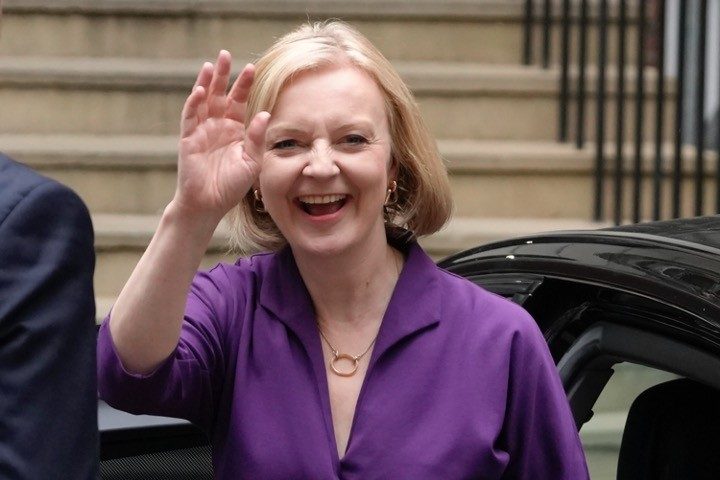
Born Mary Elizabeth Truss, Liz Truss has replaced Boris Johnson as the new prime minister of the United Kingdom, following her victory over fellow Conservative Rishi Sunak by a margin of 57-43 percent among Conservative Party voters.
In her victory statement, Truss declared, “I campaigned as a Conservative and I will govern as a Conservative.… I will deliver a bold plan to cut taxes and grow our economy.”
While it would seem logical that a member of the “Conservative” Party would govern as a Conservative, many Republicans in the United States understand that, despite the Republican Party having the reputation as the more conservative party in the U.S., many Republicans act more like Democrats — members of the country’s party that has become increasingly openly left-wing.
Truss added that “it was an ‘honor’ to be the new leader of the ‘greatest political party on Earth.’”
The United Kingdom is a unitary system, in which the central government has, ultimately, all power in the country — unlike the federal system established in the United States by the Constitution. Because it is a parliamentary system, as opposed to our presidential system, the chief executive of the government is known in Britain as the prime minister, rather than the president, and is elected by the legislative branch, not through a separate election process as in the United States. In short, there is no “separation of powers,” as our Constitution created.
Although ceremonially the monarch chooses the head of the government, and Truss did meet up with Queen Elizabeth II in Scotland for tea to accept the leadership of “her Majesty’s government,” the reality is that the leader of the majority party in the House of Commons in Parliament becomes prime minister, and the leader of the majority party is picked by members of that party. Truss won 81,326 votes from Conservative Party members, as opposed to Sunak, who garnered 60,399.
Sunak promised support for Truss. “I’ve said throughout that the Conservatives are one family. It’s right we now unite behind the new PM, Liz Truss, as she steers the country through difficult times.”
A new prime minister became necessary after the resignation of Boris Johnson. National elections are held every five years in the United Kingdom, but prime ministers in England can call for a national election any time within that five-year period (which they often do when they are far ahead in the polls). Truss vowed, “We will deliver a great victory for the Conservative Party in 2024,” when the next election will be held.
Truss praised former Prime Minister Boris Johnson, saying that he “got Brexit done, crushed [Labour Party leader] Jeremy Corbyn, rolled out the vaccine, and stood up to Vladimir Putin.”
Not surprisingly, Keir Starmer, the leader of the Labour Party, the main opposition party in Britain, immediately castigated Truss, saying that she is “not on the side of working people.” While the Labour Party has dropped “Socialist” from their party’s name in recent years, they are clearly the more left-wing of the two parties.
Starmer said, “We’ve heard far more from the latest prime minister about cuts to the corporation tax over the summer than we have about the cost-of-living crisis.” He added that there needed to be a “freeze” on energy prices, vowing that his party would keep prices down through a “windfall tax on oil and gas companies.”
Americans old enough to remember the “windfall tax” on oil companies under the presidency of Jimmy Carter know that the tax did not reduce prices for consumers, but only exacerbated the supply problem. After Ronald Reagan became president, he “de-controlled” the price of oil (Congress’ price-control law allowed a president to end such controls at his discretion), which resulted in an increase in the supply of oil and, soon thereafter, a reduction in its price. Leftists like Starmer either are ignorant of the law of supply and demand, or they do not care what is reality in economics.
It is quite clear that Starmer and his Labour Party are socialists and left-wing, but what about Truss and her Conservatives? Although she is no Ron Paul, American constitutional conservatives will like most of what Prime Minister Truss stands for.
In a speech in June, Truss vowed a commitment to freedom and individual liberty, and was critical of the overregulation by the government of people’s lives. “It’s not macho just to demand more money,” she said. “It’s much tougher to demand better value and challenge the blob of vested interests.”
While a student at Oxford, Truss was president of the Liberal Democrats, but she joined the Conservative Party after graduation. Her parents are very left-wing, and her father refused to campaign for her in political races. She has described her parents as “to the left of Labour.”
After entering Parliament, Truss founded the Free Enterprise Group of Conservative PM’s. While she originally opposed Brexit, she eventually became a strong supporter of the effort of Britain to leave the European Union. Since then, she has favored a free trade deal with Japan.
She strongly rejects what she calls “identity politics” and the “illiberalism of cancel culture.” She opposes “unconscious bias training,” and says that she shares “the values of the Christian faith.”
Although Truss voted for the legalization of same-sex marriage, she opposes gender self-identification, saying “only women have a cervix.” She says she supports an environmentalism that “doesn’t harm businesses or consumers.”
Hopefully, Prime Minister Truss will become more conservative over time. Her rhetoric is certainly better than that of the alternatives in Great Britain.



